I quit smoking more than 15 years ago (the date was February 21, 2005).
It was not so much that I didn’t enjoy smoking, but I just wanted to see if I could do it.
It was a willpower exercise for me.
The weekend before I was skiing with my friend who had stopped smoking one week earlier. After a lot of skiing and party, I concluded that I’m ready.
And by the way, you can do it, too!
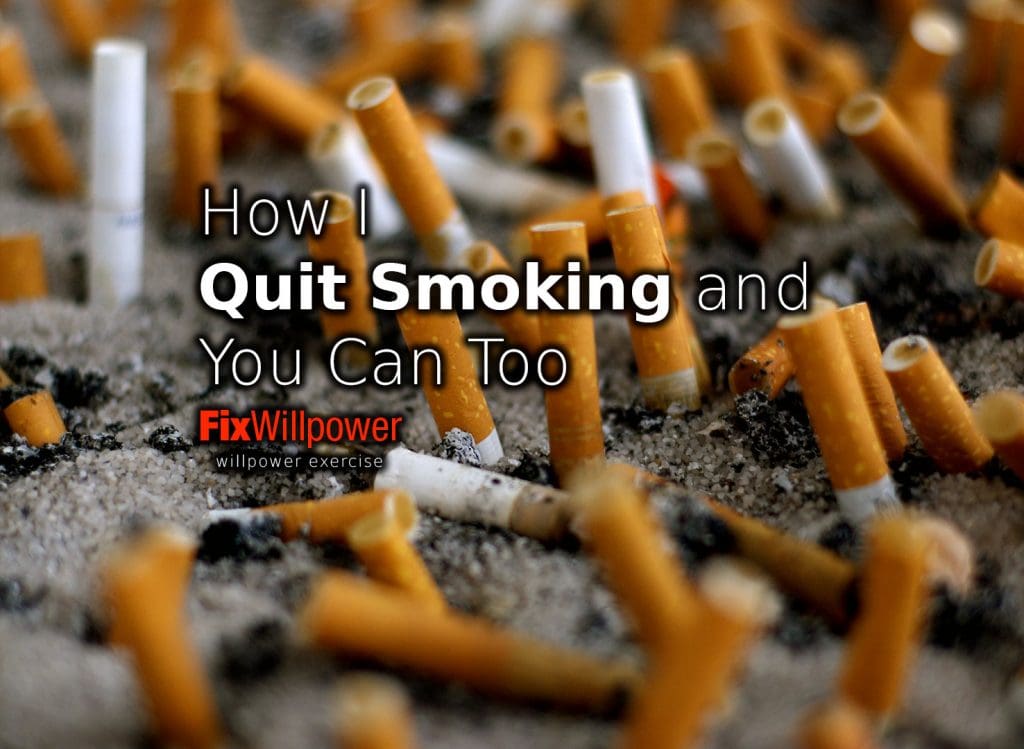

Why I think most people can quit is that when I filled in the addiction test my result was:
Your addiction to nicotine is high
You have a high addiction to nicotine, remember cravings can hamper your quit attempts so use stop-smoking medication to increase your chances of success. You should also think about using techniques to help you manage cravings when they appear.
I had smoked for 15 years 15-20 cigarettes per day. That makes about 82,000 cigarettes in total!
If I could quit smoking, anybody can.
So, here’s how I quit smoking.
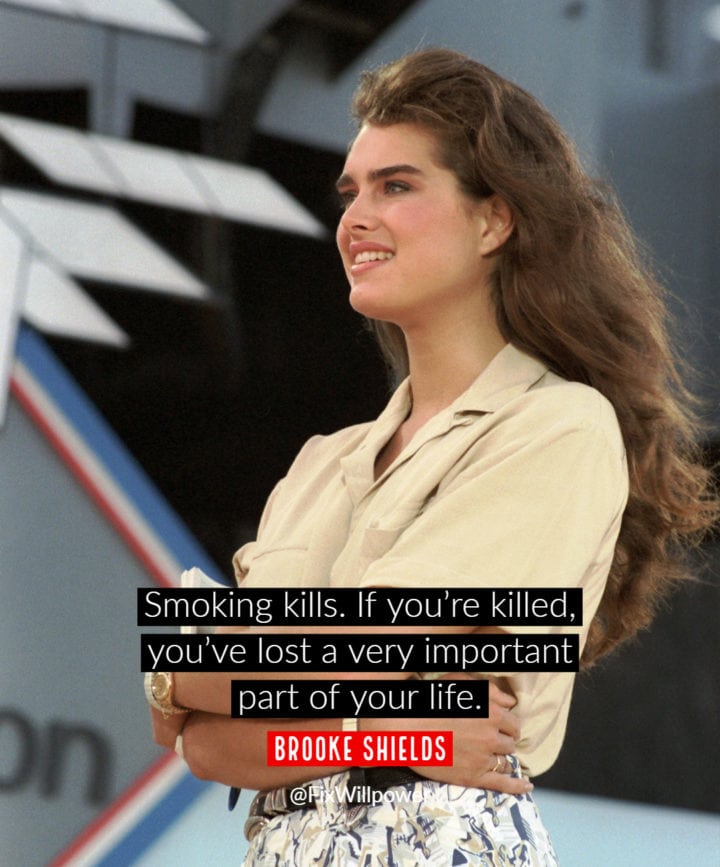
Smoking kills. If you’re killed, you’ve lost a very important part of your life. ~ Brooke Shields
Quitting smoking
I had had the idea to quit smoking for a year. I even switched to medium cigarettes the year before. On January 1st, I switched to very light cigarettes. Actually, these smokes were so weak that sometimes I had to check if they were really lit.
Before I went cold turkey, I had seven weeks of lower nicotine levels in me than usual. (Wikipedia.org: Cutting down to quit)
I am a big fan of using all the fruits of human progress to help me achieve my goals. In quit smoking, it means nicotine patches. After I quit, I started using Nicorette patches and gum to ease the cravings.
However, when you read the booklet in the box, they would like you to think you have to go gradually from strong to medium to light patches. The entire process would take about 6 months and hundreds of dollars.
I bought the strong ones and found out that I can do it in a lot less time. I used the strongest 15mg patches for two weeks and then, as I had a lot of the strong ones left, I just cut the strong patches in half.
Again, after two weeks, I was quartering the patches. And then, after a week or so, I forgot to use the patches.
Well, that’s it!
7 weeks of very light smokes followed by 5 weeks of Nicorette patches and I didn’t need cigarettes anymore.
It’s more than 15 years now.
Habit of smoking
That took care of the nicotine addiction.
But…
There was another habit, the actual physical habit of smoking. Going to the place where you smoked, the ritual of lighting up and inhaling the first puff. What do you do when your computer restarts, you have a smoke. What do you do when you wait for someone? You have a smoke. What do you do when you have had a fulfilling meal, you light up.
How do you end 30 miles on a bicycle? Have a relaxing cigarette, of course!
It is amazing how strong that habit was. Once I caught myself opening the kitchen window where I usually smoked. I had restarted my computer then automatically got up, walked to the kitchen and started opening the window. It was like sleepwalking.
Smoking makes you take regular breaks from your work to stretch and exercise (walking to the place of smoking) followed by 5 minutes of deep breathing exercises.
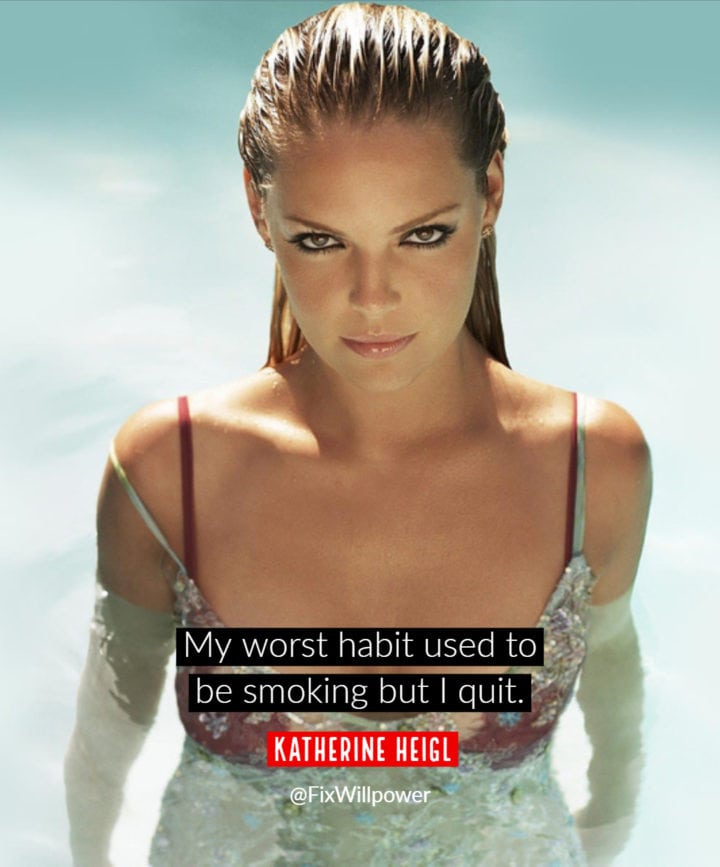
My worst habit used to be smoking but I quit. ~ Katherine Heigl
How to beat it when you feel you need to fill the void?
There’s one core idea about changing habits that will help you stop smoking.
The key is not to get rid of a habit but replace it with something else. Here’s a list of things you can do to replace your habit of smoking:
- chew gum;
- eat a carrot;
- drink water, coffee or tea;
- walk around, breathe deeply, stretch and exercise;
- call someone for a quick chat.
For me the easiest replacements were chewing gum, eating carrots, and drinking something. But even with the replacement habits, be cautious.
I found out that you can turn orange when you eat too many carrots. Not a big deal, but it’s probably too much when you start to change color.
Drinking something when you want to smoke. The key is to not drink any calories. You can drink as much water as you like. Also, unlimited tea and coffee if you don’t add sugar and milk.
No calories!
Of course, no alcohol…

I think they named the orange before the carrot. ~ Demetri Martin
This brings me to my next topic…
Quit smoking and weight gain
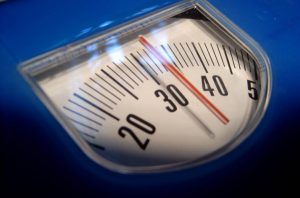
I recommend carrots, but you quickly realize that you can only stand so much of carrots. Your brain will steer you towards high-calorie items that help to fill the void left by the nicotine and physical habit.
Studies associate smoking cessation with a mean increase of 4-5kg in weight after 12 months of abstinence. Most weight gain occurs within three months of quitting. Variation in weight change is large, with about 16% of quitters losing weight and 13% gaining more than 10 kg. [Weight gain in smokers after quitting cigarettes: meta-analysis]
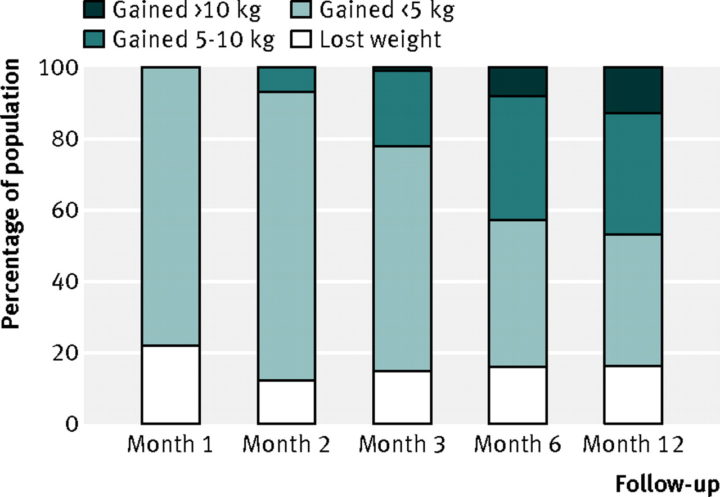
Percentage of untreated quitting population who would be expected to lose weight, gain <5 kg, gain 5-10 kg, or gain >10 kg over 12 months.
By the end of the year (approximately 10 months) I had gained 18 pounds. During that time I did nothing to control my weight or diet. I continued to eat whatever and whenever I wanted.
I think not trying to diet is a good thing.
Trying to stop smoking and lose weight at the same time will overwhelm you and you will most likely fail at both.
I suggest that you should concentrate on staying off the cigarettes, and deal with the weight issues in 6 months or even a year after quitting.
The most efficient countermeasure I could find to overcome the physical habit of smoking was chewing gum. Always carry a pack with you.
Social aspects of quitting smoking

Give people money and tell them they don’t have to pay you back if you start smoking again. Make bets you stay off the smokes with people who will make you pay.
Stop smoking with a friend
I had a friend who quit a week before me, and it was really helpful. We discussed what we felt and support each other during tougher times like parties with a lot of alcohol consumption.
Alcohol and smoking went hand in hand for me. Whenever I was at a party that involved drinking, I was also smoking a lot more. On an average day, I smoked 15-20 cigarettes, but when I was drinking, it scaled to chain-smoking two packs or even more.
Alcohol kills your willpower to stop smoking. Booze messes with your mind in more ways than one,
- lowering blood sugar levels,
- impaired judgment,
- loss of self-control,
- lessening of inhibitions and
- you care less about the errors you make.
All this means that getting drunk can make you relapse. From my experience, I can say that you don’t have to stop drinking or avoid parties but be very careful in those situations.
And here’s one very important recommendation to people who have more than a few drinks at parties.
Bring nicotine chewing gum with you. When the cravings or smoke in the room gets overwhelming, just chew the gum. Put a fresh patch on before going to a party.
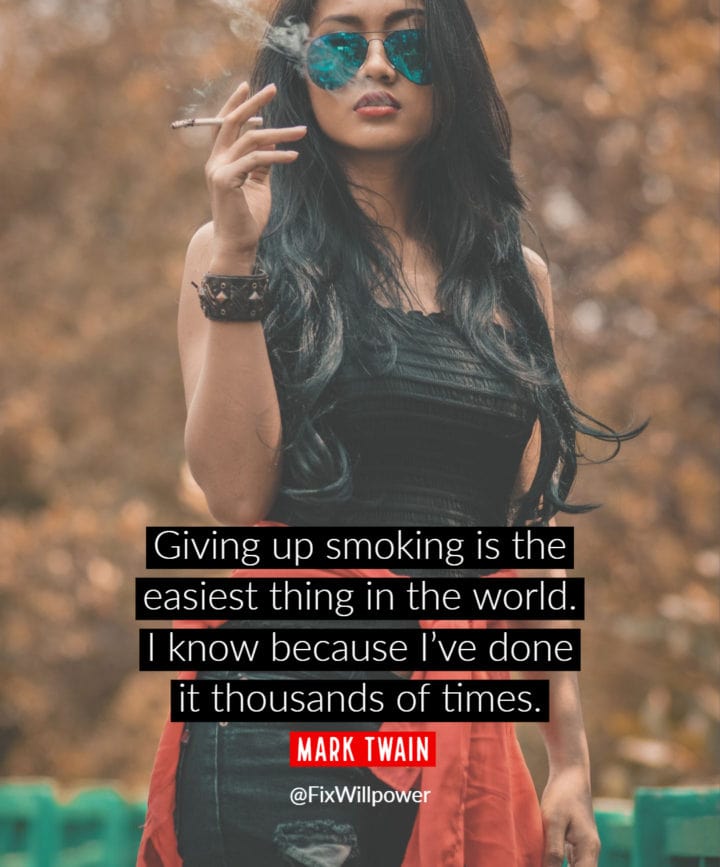
Giving up smoking is the easiest thing in the world. I know because I’ve done it thousands of times. ~ Mark Twain
Quit as many times as you need to quit smoking
Many people need more than one attempt at quitting smoking. If you relapse, forgive yourself and quit again. Do it as many times as it takes to get off the smokes.
Knowing how many quit attempts it takes an average smoker to quit is important as it can frame different narratives about the quitting process. This information can be used to inform smoking cessation advice and important messages to stay engaged in the process of quitting. ~ Study: Estimating the number of quit attempts.
I loved smoking
I loved the taste of smokes.
I loved the activity of smoking.
So, after more than 6 or 7 years of not smoking I started to smoke again.
Well, not really. I had maybe one cigarette in two or three months when I was out with friends. I still loved smoking. I was very careful not to have more than one smoke at the time.
One day I was out with friends again, more than 15 years after I quit smoking and I had another smoke.
I hated it.
I could feel the unpleasant taste even in the next morning.
I don’t thing I will light up again.
Benefits of quitting smoking

For starters just the powerful sense of accomplishment. It is a big deal if you can quit.
Be proud! Give yourself credit!
It was one of my main motivators just to find out if I can stop smoking. Statistics show that only 3-6% of quit attempts without help are successful long-term.
It feels good. In a few weeks or a month, you will notice that you feel better and have more energy.
More taste. As your tongue gets cleaned from tar and recovers its sensitivity, you will have more taste in your food. Everything becomes more nuanced, and you may start using less spice.
No hangovers. In a few months, you notice that you have no more hangovers after the party where you had “one” too many.

The result?
More than 6.7 liters, this means a 10% increase.
Non-smoking or non-smoking. These are your options if you ever need to fly somewhere. Sure, you can endure a few hours without a smoke, but what if you go long-distance?
You can stay in buildings. In many places, it is forbidden to smoke in public places, government buildings, restaurants, nightclubs, hospitals, schools, etc. As a non-smoker it’s OK!
Clean clothes. You don’t smell like a butt of a cigarette. It’s really nice if you think about it.
Save money. Depending on where you live you will save about 1000 to 2000 dollars per year. You can get a lot of nice stuff for that amount of money. Every year after quitting!
Whiter teeth. Not smoking means no tar and other chemicals on your teeth.
Better sex. Better blood supply in important parts of your body, more lung capacity, and more energy, in general, will lead to better performance in bed.
Be proud of yourself. It’s not an easy thing to conquer tobacco addiction. Less than 1 in 10 can do that. Feel proud; you have earned it.
It’s a GREAT willpower exercise!

Get me well so I can get on television and tell people to stop smoking. ~ Nat King Cole
Some final points
You may think smoking relaxes you and helps you deal with everyday stress. Some may even think smoking is cool. I could trace my smoking back to social pressure and the coolness factor (I was 17). Well, it’s not.
Here are the steps I took to quit smoking. I’ll add a time range to each step:
- Take a few months to move to lighter cigarettes step-by-step. If you can, decrease smoking frequency during that time. But make sure you do not increase frequency (2-6 months).
- In the last few weeks before quitting smoking switch to ultralights (5-10 weeks).
- Quit smoking and use strong patches for a few weeks (2-4 weeks).
- Switch to medium patches or cut the strong ones in half (2-4 weeks).
- Switch to the lightest patches or quarter the strong patch. By this time, you should start to forget to wear a patch (2-4 weeks).
- Well, you are done.
Remember that the highest rate of relapse occurs during the first three months after quitting. Be extra vigilant during that time. Carry strong nicotine gum for emergency use. When you reach six months, you may congratulate yourself. Most of those who have stayed off that long will stay off for good.
Do not lie to yourself that you can quit anytime you want. Just admit that you are addicted and start planning on how to kick the habit.
Resources
I have collected some resources that add to my personal experience. Use all the help you can.
- Steps to Take on Your Quit Day
- FDA 101: Smoking Cessation Products
- The EX Plan a free quit smoking program
- SmokeFree.nhs.uk
Please, share your thoughts about quitting smoking in the comments. Why did you quit and what have been the greatest benefits of quitting.
_________________________________
Image credits:
Katherine Heigl
The Killing Fields by Matthias Weinberger
Daisy Age by Steve Ford
Friendship 2 by Tory Byrne
Scale 1 by Peter_W
Calendar by Doru Lupeanu
![Read more about the article Spend Some Time Alone [and Focus on Yourself]](https://fixwillpower.com/wp-content/uploads/spend-some-time-alone-429x314.jpg)
![Read more about the article Go for a Walk to Boost Your Well-Being [VIDEO]](https://fixwillpower.com/wp-content/uploads/willpower-habit-walking-429x314.jpg)
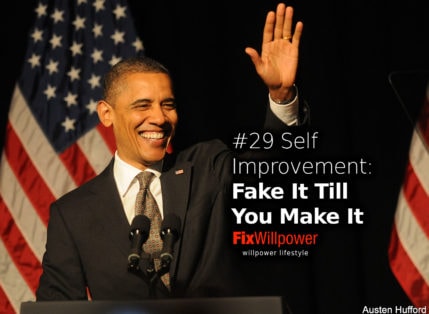
![Read more about the article Here’s How to Stop Procrastination Now [VIDEOS]](https://fixwillpower.com/wp-content/uploads/procrastination-429x314.jpg)
Nice article to keep me motivaties. I don ‘t die patches and have a hard time to quite smoking. But it’s enough after 36 years. So addicted
Lot of people fears that because of quiting smoking, they will gain weight. So besides problem based on an addiction habits, they’ve got new cravings or much more intense desires for snacks etc. With this book you can try to overcome everything – net-bossorg/the-easiest-way-to-quit-smoking-for-life
Hi good advice
Smoking tobacco is both a physical addiction and a psychological habit. The nicotine from cigarettes provides a temporary, and addictive, high. Eliminating that regular fix of nicotine will cause your body to experience physical withdrawal symptoms and cravings. Because of nicotine’s “feel good” effect on the brain, you may also have become accustomed to smoking as a way of coping with stress, depression, anxiety, or even boredom..-,,
Our own web portal
<https://wellnessdigest.co